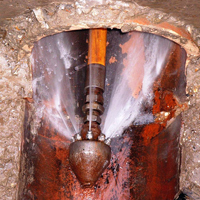
More and more people are discovering the benefits of using hydro-excavation over regular excavation. This is a method of moving or removing soil, using pressurized water and a vacuum or air conveyance that transfers the debris or soil to a tank. If you’re considering using this technique, here’s how it got started, as well as some of its many benefits and uses.
History of Hydro-excavation
This type of technology, which dates back to over 50 years ago, began with the Canadian gas and oil industry. Because of the region’s below-zero temperatures, facility owners were forced to use heated water for thawing frozen ground. Although it succeeded, the process was extremely messy. This led to using a vacuuming system designed to suck away mud.
Besides Canada, the hydro-excavating process continues to be popular in America, Europe and Australia as an effective way to excavate around underground utilities and unidentified pipelines.
Advantages of Hydro-excavation
The most important advantage of using hydro-excavation is its safety feature. Unlike using a shovel or backhoe, there’s no risk of rupturing underground utilities such as water pipes, gas lines, electrical lines or telecommunication cables.
Pressurized water breaks up the soil and liquefies it so that it’s safely sucked away. Before the machine excavation starts, any buried infrastructures are identified. Because water is used, there isn’t as much abrasion on utility coatings.
Other benefits include:
- Cleanliness—This process offers a work area that’s much cleaner than using standard exaction as all debris, dirt and rocks are vacuumed into a tank. This makes it more environmentally friendly.
- Affordability—You save money because there aren’t any expensive or dangerous pipeline breaches as this method uses surgical exactness.
- Time-saver—It’s about 10 times as fast as regular excavation.
- Accessibility—You’re able to dig into areas that are aren’t accessible for the equipment used in regular excavation.
- Year-around service—You don’t have to wait until temperatures are warmer as this process can be done during the coldest weather.
Common Uses of Hydro-excavation
Hydro-excavation has many uses. Some of the most common ones include repairing leaks, trenching, digging in confined spaces, exposing utility lines, repairing curb boxes, excavating frozen ground, tank cleaning, tunneling, removing debris, pot holing and subsurface engineering.
Vactone Environmental Services can effectively take care of your environmental problems without costing you a lot of money. In addition to providing vacuum truck services, these professionals also offer drain cleaning, storm maintenance and other services for the Massachusetts areas. Please contact us.
